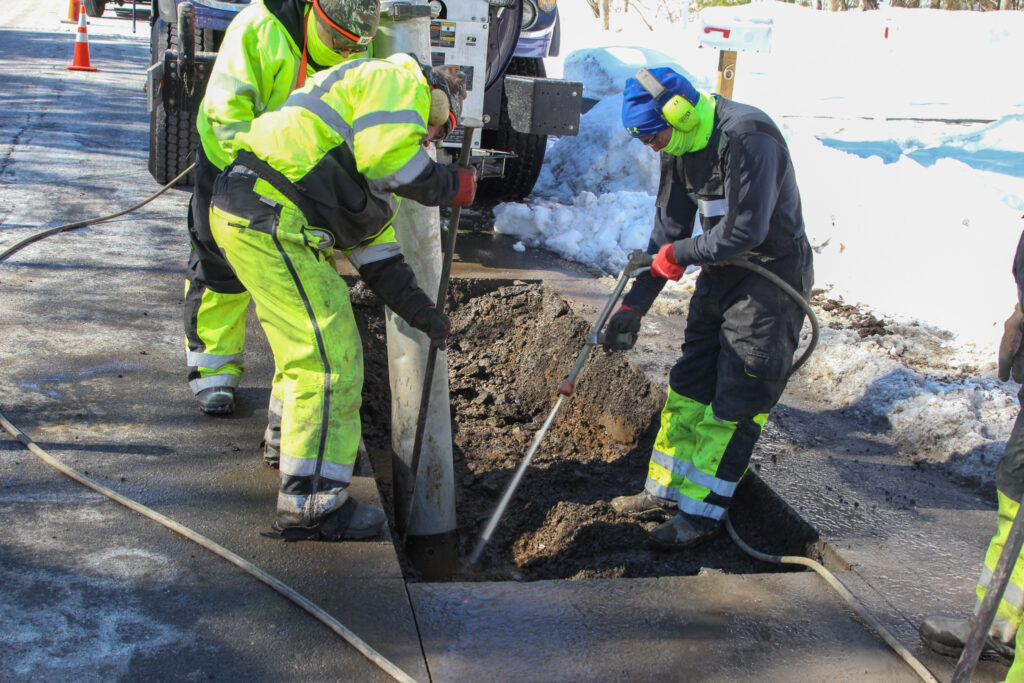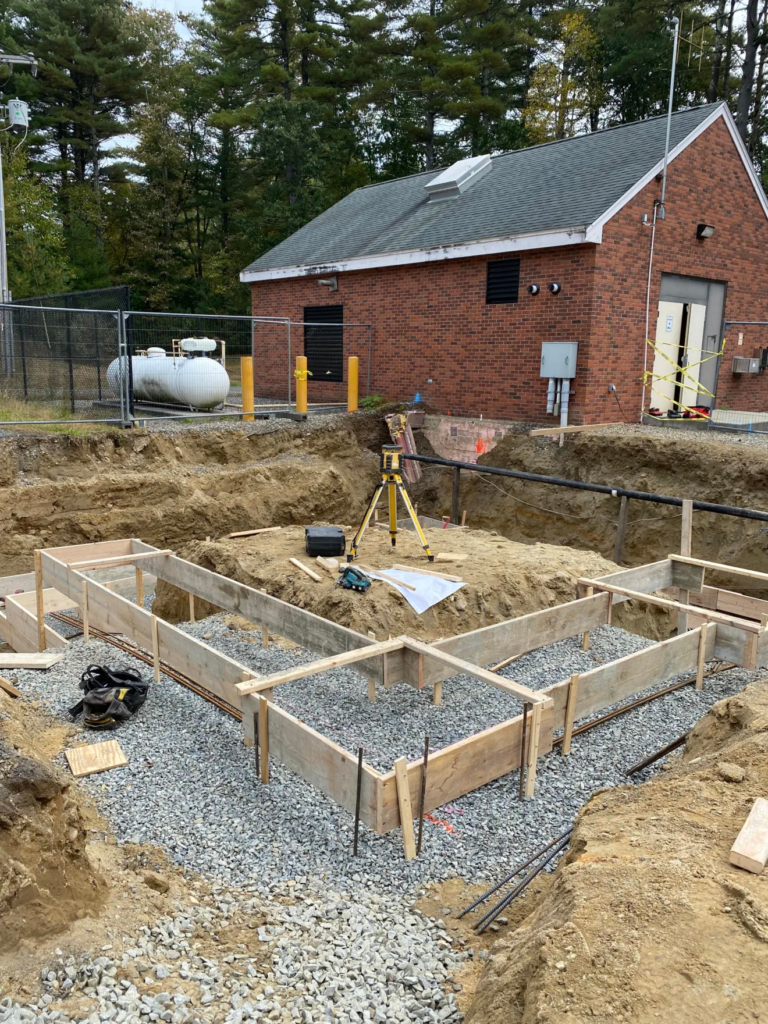Town Manager Norman Khumalo on Friday released a series of documents detailing the town’s interaction with the Eversource liquefied natural gas (LNG) facility on Wilson Street in an effort to allay public concerns about the operation.
The facility, which stores and cools natural gas, is located at two parcels: a 25.2-acre parcel located at 52 Wilson Street and a 51.4-acre parcel at 55 Wilson Street. Vaporization and liquefication equipment is located at 52 Wilson Street, as well as the equipment and buildings needed to process and distribute the gas. Three cryogenic storage tanks are located at 55 Wilson Street, as well as facilities for truck loading and unloading. One of these tanks — Tank B — was the subject of an investigation into “a thermal anomaly” six years ago.
At a May 9 Select Board meeting, several residents who live near the LNG facility expressed concerns about the aging gas tanks. They requested a special meeting to discuss potential safety issues, and Khumalo agreed to arrange a forum. This request came after the town’s police and fire chiefs spoke about the effectiveness of a May 4 emergency preparedness test at the site.
“Hopkinton has an extensive history of involvement in matters concerning the LNG plant and continues to have ongoing substantive work concerning the LNG Plant,” reads a statement released by the town Friday.
Also noted was that the town “has engaged an independent LNG safety consultant to advise this office and town staff on all matters of LNG safety associated with the LNG plant.” In addition, the statement shared that town officials, including the director of municipal inspection, principal planner and conservation agent, “review and analyze all permits and other applications” that go before town departments and state agencies.
In a statement from Town Counsel Bryan Bertram simultaneously released on Friday, he explained that his office compiled documents at Khumalo’s request. However, he said he chose documents that were the most relevant to the situation in order to prevent a “document dump.”
“These documents represent only a subset of all documents related to the various events, issues, and proceedings that have involved the town and the LNG facility,” he wrote. “I have tried to select those documents that best and most fully reflect the Town’s substantive work to identify, review, and advocate on the LNG Facility’s impact on the Town, including issues relating to safety and public welfare. I have done so to avoid providing a ‘document dump’ that would only frustrate rather than aid the public’s understanding of the Town’s historical involvement with the LNG Facility.”
What isn’t reflected in these documents, Bertram stressed, is much of the town’s involvement with the LNG facility. Actions such as emergency planning and related training by outgoing Fire Chief Bill Miller and other town staff members, including the creation of an emergency response guide for the plant, were not detailed in the documents released.
“A large amount of the town’s work has been its participation in adjudicatory proceedings before the Department of Public Utilities,” Bertram continued. “The town reviews all filings from all sources in those proceedings — including Eversource — which are voluminous.”
The town also has been involved in “highly technical and lengthy regulatory proceedings,” he added.
Regarding the construction of the liquefier project, the statement noted that the director of municipal inspections and other town staff “continue to monitor” the work being performed.
One concern raised in the documents was the “thermal anomaly detected in Tank B.” According to the statement, town staff and town counsel have engaged in discussions with Eversource about the LNG facility, including “from time to time, investigated public complaints about events at the LNG Plant.” A meeting also was held “several years ago with the DPU’s chief of staff and Pipeline Safety Division” regarding safety concerns with Tank B.
In a briefing to the Select Board on June 29, 2021, it was stated that “in December 2017, the company discovered a ‘thermal anomaly’ in Tank B but did not tell the town until August 2018. The company subsequently emptied the tank. It was determined that the seal around a temperature probe failed, causing an inner tank to leak into an outer tank — but not into the outside atmosphere.” This finding prompted the facility repair work.
Because Eversource did not notify the town about the thermal anomaly, the town initiated a public records request in 2019 to the Department of Public Utilities. The DPU complied. Some information was redacted due to confidentiality and security concerns. At that time, there was no public evacuation plan in place for the town, according to a July 9, 2019, briefing by Eversource to the Select Board.
State’s Appellate Tax Board sides with town on LNG tax abatement case
One document included in the release was a decision issued on Oct. 6, 2020, on an appeal filed by Eversource against the town’s Board of Assessors to the state’s Appellate Tax Board the board found in favor of the town. Eversource had sought a tax abatement because of the depreciating property value despite the age of its equipment. The tax abatements requested were for fiscal years 2014, 2015 and 2016 (tax assessments of approximately $975,000, $990,000 and $915,000 from 2014 to and including 2016, respectively.)
In this decision, it was explained that the three cryogenic tanks, including Tank B, can hold 1 billion cubic feet of the vapor equivalent of liquefied natural gas. These tanks store gas used during the highest demand for heating during the winter to help mitigate fuel costs. NSTAR, the local gas distributor, buys it at a lower than market value cost. Because of this, it is called a “peak shaving facility,” and it is the largest peak shaving facility in New England.
At issue was the value of improvements made to the property, according to a report on the case’s findings of fact. At the time, the facility’s property value was $4,818,800. Infrastructure at the facility there was estimated to last for 40 years, so the tanks “were approaching the end of their expected life” in 2012, according to testimony cited in the document by James Davis, the director of gas system operations for Eversource Energy.
A more specified study was performed in 2014 by an independent company that specializes in LNG facilities confirmed the “replacements, upgrades and refurbishments” recommended in the first study. Both studies “indicated that millions of dollars of refurbishments, repairs, and replacements were needed to maintain the subject facility.” These requests were made “for replacement of the liquefaction and vaporization systems; none were for the replacement or refurbishment of the three cryogenic tanks.”
At the date of the hearing, there were “no plans to replace the subject facility’s three tanks,” even though they were nearly 50 years old. Because they were still operational, they were considered to be “in good condition,” according to testimony from Davis.
The document also stated that there is no production of natural gas in New England. The gas used here is delivered to the region through interstate natural gas pipelines from Algonquin Gas Transmission and Tennessee Gas Pipeline.
The decision in the town’s favor showed that the LNG facility is “of critical importance to the operations of NSTAR during the New England winter, providing up to 45% of the gas needed to sustain heat to customers on the coldest days.” Because of financial risk, it was determined “highly unlikely” that another buyer would purchase the facility.
The commissioners concluded that “the appellant failed to meet its burden of proving values for the subject properties that were lower than their assessed values for each of the fiscal years at issue.” This essentially negated the request for a tax abatement because the appellant failed to prove that the values of the assessed properties were lower than their assessed value.





















0 Comments